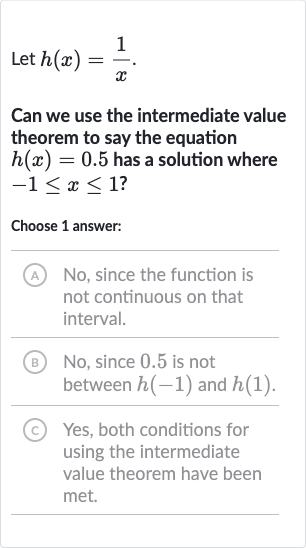AI tutor
Welcome to Bytelearn!
Let’s check out your problem:

Let .Can we use the intermediate value theorem to say the equation has a solution where ?Choose answer:(A) No, since the function is not continuous on that interval.(B) No, since . is not between and .(C) Yes, both conditions for using the intermediate value theorem have been met.
Full solution
Q. Let .Can we use the intermediate value theorem to say the equation has a solution where ?Choose answer:(A) No, since the function is not continuous on that interval.(B) No, since . is not between and .(C) Yes, both conditions for using the intermediate value theorem have been met.
- Check Conditions: To use the intermediate value theorem, we need to check two conditions: the function must be continuous on the closed interval , and the value we are looking for (in this case, ) must be between the values of the function at the endpoints of the interval.
- Function Continuity: First, let's check if the function is continuous on the interval . We know that the function is not defined at , which lies within the interval . Therefore, the function is not continuous on the entire interval.
- Use of Theorem: Since the function is not continuous on the interval due to the discontinuity at , we cannot use the intermediate value theorem to guarantee that there is a solution to the equation on this interval.
More problems from Intermediate Value Theorem
QuestionGet tutor help
QuestionGet tutor help
QuestionGet tutor help
QuestionGet tutor help
QuestionGet tutor help
QuestionGet tutor help
QuestionGet tutor help
QuestionGet tutor help
QuestionGet tutor help
